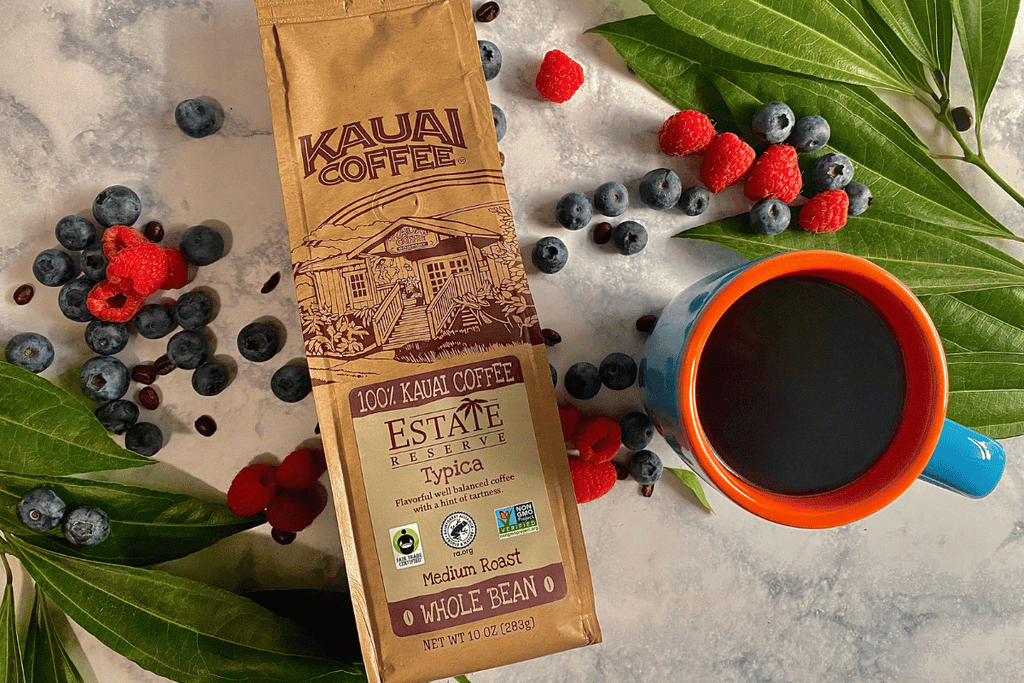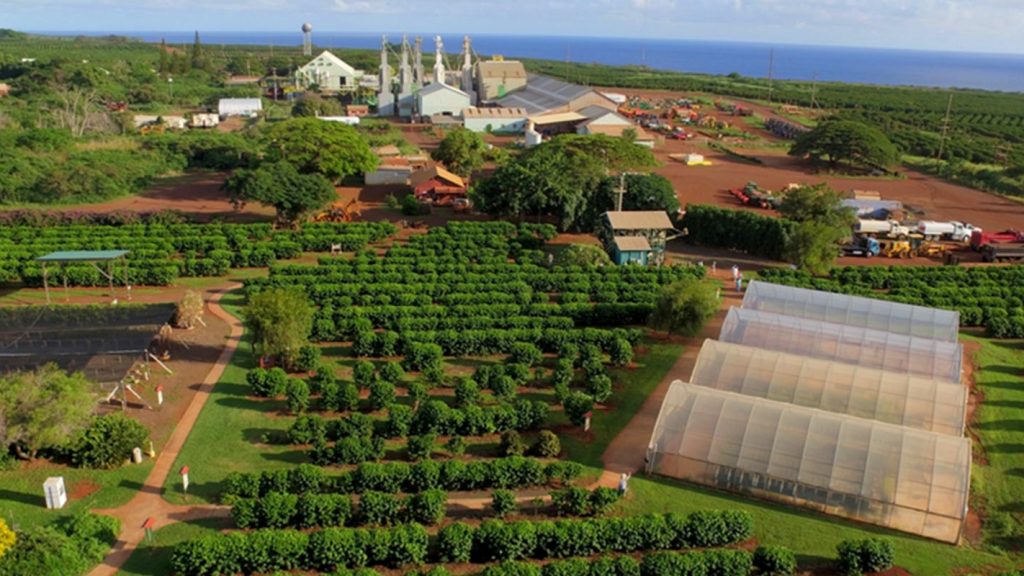
What is Arabica Coffee?
Arabica coffee is one of the most popular and widely consumed coffee species in the world. Renowned for its smooth, aromatic, and nuanced flavors, Arabica coffee dominates the specialty coffee market and is cherished by connoisseurs and casual drinkers alike.
To understand what sets Arabica coffee apart, you need to know a little bit about its unique botanical characteristics, origins, varieties, taste profiles, and cultivation methods, especially in unique regions like Hawaii.
As the largest coffee grower in the USA, we have put together this guide to help you learn more about this unique species that many people interact with daily and what to look for when purchasing Arabica coffee from Hawaii. So, grab your favorite cup and join us for a botanical breakdown of our favorite beans!

A Little Bit About Coffee Botany
In botanical taxonomy, the coffee plant belongs to the Rubiaceae family, which includes more than 120 species. However, only two species, Coffea arabica and Coffea canephora (commonly known as Robusta), are commercially relevant. According to the US International Trade Commission, Arabica coffee accounts for approximately 60-70% of the world's coffee production, while Robusta makes up the remaining percentage. The distinction between these two species lies not only in their botanical characteristics but also in their taste, growing regions, and economic value.

Arabica is Coffee with Altitude (Or Not!)
Arabica coffee thrives at various altitudes in tropical regions, which produces significant differences in flavor profiles depending on the elevation. In Hawaiian growing regions, such as Kona and Kauai, the altitudinal range plays a crucial role in the quality and characteristics of the coffee produced. At lower altitudes, Arabica coffee benefits from warmer temperatures and faster growth cycles, which often results in beans with a milder flavor profile, lower acidity, and a heavier body.
Conversely, higher tropical altitudes provide cooler temperatures and slower maturation for the coffee cherries. This slower growth often yields beans with bright acidity, pronounced fruity or floral notes, and a balanced cup. In Hawaii, the diverse altitudes of coffee plantations, such as those on the volcanic slopes of the Kona District and mountainous hills and valleys of southern Kauai, create a unique environment where Arabica coffee can express a wide spectrum of taste profiles, making Hawaiian coffee a sought-after choice.

Coffee Origin or Variety?
The term "coffee origin" refers to the geographical region where the coffee is grown, not the type of coffee. Many coffee drinkers often confuse the coffee origin with the coffee variety. A variety is a unique, naturally occurring population of plants within a species. Arabica coffee grows in many places around the world, and its varietals have unique characteristics that result from natural selection and cultivation practices.
Much like the altitude, the climate, soil, and other environmental factors in coffee origins can significantly influence the flavor and quality of the Arabica varieties grown there.
Ethiopia, often considered the birthplace of coffee, produces Arabica beans with a wide range of flavor profiles, from fruity and floral to wine-like. South American Arabica is celebrated for its bright acidity and balanced flavor, making it a favorite in the specialty coffee industry. Hawaiian Arabica, grown in lower altitudes compared to other regions, can have a nutty and chocolatey profile, with a heavier body and lower acidity.

Arabica Varietals
Arabica coffee has numerous varietals, each with unique characteristics and flavor profiles. In Hawaii, specific Arabica varietals are cultivated to produce high-quality coffee.
Kauai Coffee Company only cultivates Arabica coffee varietals, including Bourbon, Typica, Red and Yellow Catuai, Mundo Novo, Blue Mountain, and Acaia. Each offers distinct flavor profiles that reflect the island's unique terroir. The island's nutrient-rich volcanic soil, combined with its ideal climate and careful cultivation practices, results in a unique and high-quality coffee experience.

Arabica Flavor Notes
In addition to its origin, the taste of Arabica coffee is influenced by various factors, including how it is processed after harvest, roasted, and brewed.
Roasting: The roasting process can significantly affect the taste of Arabica coffee. Light roasts preserve the bean's original flavors, showcasing fruity and floral notes, while dark roasts bring out deeper, caramelized flavors with a bolder, richer taste. Medium roasts strike a balance, highlighting both the flavors of the origin and the roasting characteristics.
Brewing Methods: How Arabica coffee is brewed also impacts its flavor. Methods like pour-over, French press, and espresso highlight different aspects of the coffee's taste, from its acidity and body to its aromatic profile. Pour-over methods, such as Chemex and Hario V60, can emphasize the clarity and brightness of the coffee. At the same time, French press brewing emphasizes body and mouthfeel.

Influence of Processing Methods
In addition to roasting and brewing, the processing method used to prepare the coffee cherries for roasting can also influence the flavor of Arabica coffee. The main processing methods are:
Washed (Wet) Process: This method involves removing the cherry's pulp and fermenting the beans to remove the mucilage before drying. Washed coffees typically have a clean, bright flavor with pronounced acidity.
Natural (Dry) Process: In this method, the cherries are dried with the pulp still intact, allowing the beans to absorb more fruit flavors. Natural processed coffees often have a heavier body and fruity, wine-like flavors.
Honey (Pulped Natural) Process: This is a hybrid method in which the cherries are partially de-pulped but allowed to dry with some mucilage remaining. Honey-processed coffees can have a balanced profile with fruity sweetness and a clean finish.

Recommendations for Hawaiian Coffee Lovers
All of the 100% Hawaiian Coffee we sell is 100% Arabica coffee grown on Kauai. Each has unique characteristics suited for various preferences. Some of our 'ohana favorites and top sellers include:
Blue Mountain: Known for its mild flavor, balanced acidity, and smooth body, this varietal is a favorite among coffee enthusiasts. Blue Mountain coffee, originally from Jamaica, is grown in small quantities on Kauai, benefiting from the island's volcanic soil and ideal climate.
Typica: A classic Arabica varietal with a well-rounded flavor profile, including hints of chocolate and nuts, perfect for a traditional coffee experience. Typica is one of the earliest cultivated varietals and is the genetic base for many other Arabica varietals.
Bourbon: Known for its complex acidity and deep sweetness, Bourbon is one of the oldest Arabica varietals.

Get Arabica Coffee from Hawaii, Subscribe to Kauai Coffee
We offer a diverse selection of premium Arabica coffee beans grown in the fertile soils of Kauai. By subscribing, you can enjoy a regular supply of freshly roasted 100% Hawaiian coffee delivered to your doorstep, ensuring you never run low on aloha. Our convenient subscription allows you to customize your coffee preferences and receive exclusive access to new releases and special promotions.

Enjoy the Flavors of Arabica with Kauai Coffee
Arabica coffee is a cornerstone of the global coffee culture because of its rich history, diverse varietals, and exquisite flavors. Kauai Coffee's commitment to cultivating and producing high-quality Arabica beans ensures that every cup is a testament to the unique characteristics of Hawaiian-grown coffee.
Whether you prefer the bold notes of Red Catuai, the balanced flavors of Blue Mountain, or the rich taste of Typica, Kauai Coffee offers an experience that is both distinctive and unforgettable. With sustainable farming practices and a dedication to quality, Kauai Coffee stands out in the world of Arabica coffee. Shop our entire collection of 100% Hawaiian Coffee online now.







